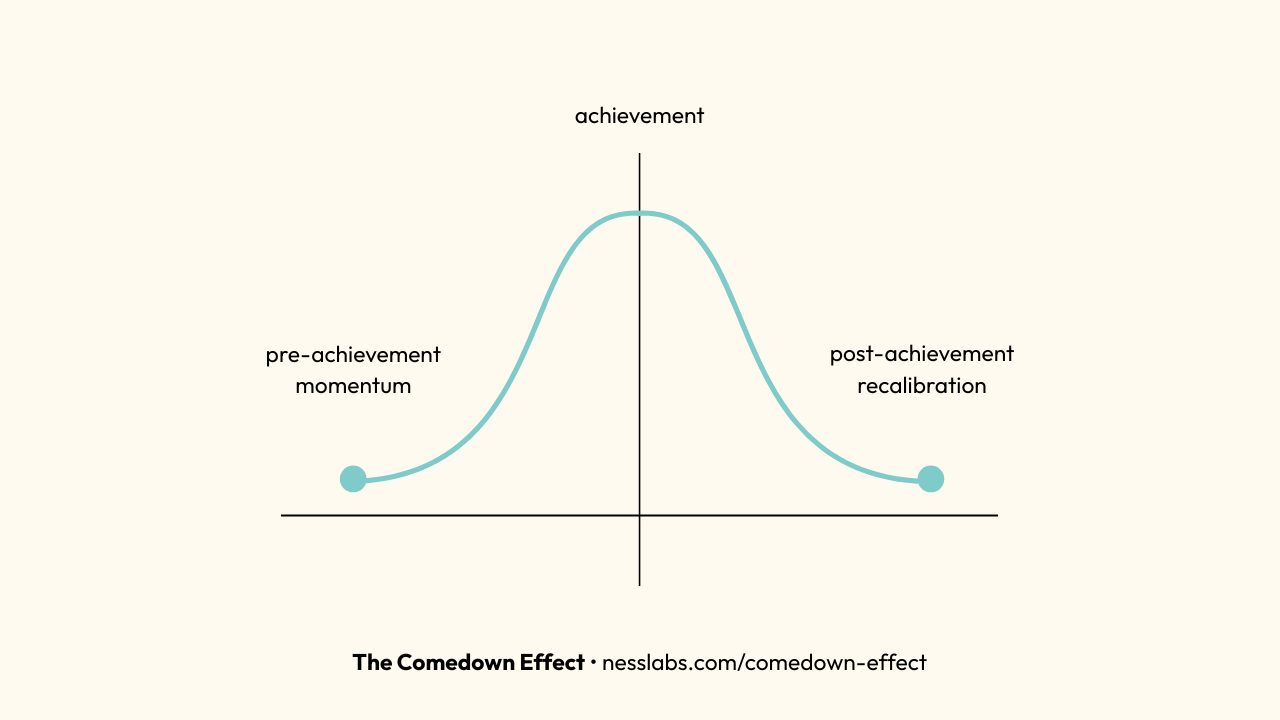A month ago, my book Tiny Experiments finally made its way into the world after years of work. Launch day brought a flurry of notifications and messages of support, along with that strange feeling of seeing something that existed only in my mind now in other people’s hands.
There’s something surreal about thousands of hours of work culminating in a single moment.
As I write these words, I can feel the first signs of what I’ve come to call the “comedown effect” – the psychological recalibration that occurs after a major achievement, when your brain transitions from the intensity of doing to the quieter state of done.
Although it’s a natural readjustment, this comedown can feel disorienting even in the midst of success.
The emotional aftermath of achievement
The comedown effect is largely driven by our brain’s dopamine system, which regulates motivation and reward processing. Contrary to popular belief, dopamine isn’t primarily about pleasure but about anticipation.
Research shows that dopamine neurons respond most strongly to unexpected rewards. However, once rewards become expected (which is the case once we’ve completed a big project), these same neurons decrease their firing rate, creating a neurochemical environment that can feel like emotional withdrawal.
That’s why many of us experience what feels like a “post-completion void” – that hollow space that opens up when the work that once shaped our days and thoughts is suddenly complete.

Public achievements add another layer to the comedown effect. When our work becomes visible to others, we might start measuring its value through external validation. That social media post celebrating your launch might feel great when the likes roll in, but empty a day later, making you seek more dopamine hits to relive that initial high.
So, how can you land more softly after achieving something big?
Five strategies for a gentler landing
The comedown effect is a normal part of creating and achieving. We can’t avoid it completely, but we can learn to handle it better. Here are five strategies to manage this natural post-achievement emotional recalibration.
- Create a liminal ritual. Help your mind process the transition by marking the end of your project with a simple ceremony – a special dinner, a day outdoors, or a cosy gathering with friends and colleagues who supported your journey.
- Integrate the experience. Set aside 10 minutes daily for 10 days after your project ends to write about what happened and how you felt. This creates what neuroscientists call a “memory consolidation period”, ensuring you learn from the experience.
- Start a small, unrelated experiment. After a big achievement, your brain craves the dopamine hit of novelty and progress. You can satisfy this by exploring something low-stakes and completely different from your main work with no pressure to excel.
- Look inward for validation. Research consistently suggests that intrinsic motivation leads to more sustainable well-being. Consciously shift your focus from outside measures of success (sales, reviews) to internal values (what you learned, how you grew).
- Explore what’s next without committing yet. While still celebrating your achievement, gently consider potential future directions. This provides your brain’s reward system healthy continuity rather than leaving a motivational vacuum.
Humans are wired for exploration. That’s why we derive more lasting satisfaction from the journey than from the attainment. That’s also why each big milestone is better thought of as a marker along your own unique path and not as a final destination.
The comedown effect is a natural reset that prepares us for our next creative season. It returns us to the open-endedness of curiosity, meaning-making, and lifelong learning.
Once we understand how it works, we can meet our achievements with a kind of dual awareness: celebrating the summit while remembering that an experimental life is made of both ascents and descents, forming growth loops that are sometimes uncomfortable, but always generative.
